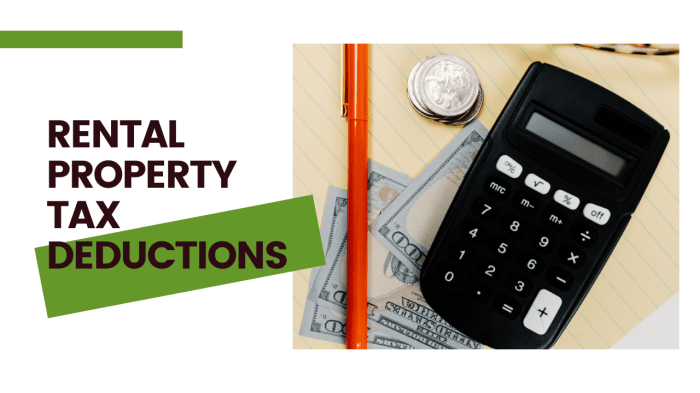Get ready to dive into the world of tax deductions for small businesses, where every dollar saved counts. From uncovering hidden deductions to maximizing savings, this topic is your ultimate guide to financial success as a small business owner.
In this comprehensive guide, we will explore the importance of tax deductions, eligibility criteria, common deductions, and the art of record-keeping for small businesses.
Importance of Tax Deductions for Small Businesses
Tax deductions play a crucial role in helping small businesses save money and reduce their overall tax burden. By taking advantage of allowable deductions, small businesses can keep more of their hard-earned profits and reinvest in their growth and development.
Examples of Common Tax Deductions
- Business expenses such as rent, utilities, and supplies
- Employee wages and benefits
- Depreciation of business assets
- Health insurance premiums for employees
- Home office expenses for self-employed individuals
How Tax Deductions Help Reduce Tax Burden
By deducting eligible expenses from their taxable income, small businesses can lower the amount of income subject to taxation. This results in a lower tax bill and more money retained within the business for further investment and growth. Tax deductions serve as a valuable tool for small businesses to maximize their financial resources and increase their bottom line.
Eligibility Criteria for Tax Deductions
In order for small businesses to qualify for tax deductions, they must meet certain criteria set by the IRS. These criteria are essential for businesses to take advantage of tax savings and reduce their overall tax liability.
Types of Small Businesses Eligible for Tax Deductions
- Sole Proprietorships: Individuals who run businesses on their own are eligible for tax deductions based on their business expenses.
- Partnerships: Businesses with multiple owners can claim tax deductions based on their share of the partnership’s profits and losses.
- LLCs: Limited Liability Companies can also take advantage of tax deductions available to businesses.
- S Corporations: Small businesses structured as S Corporations are eligible for tax deductions on their business expenses.
Specific Requirements for Claiming Tax Deductions
- Accurate Record-Keeping: Small businesses must maintain detailed and accurate records of their expenses to support their tax deduction claims.
- Business Use of Expenses: Expenses must be directly related to the business and necessary for its operation to qualify for tax deductions.
- Documentation: Businesses need to keep receipts, invoices, and other documentation to substantiate their expenses when claiming tax deductions.
- Compliance with Tax Laws: Small businesses must comply with all relevant tax laws and regulations to be eligible for tax deductions.
Common Tax Deductions for Small Businesses

Small businesses can take advantage of several tax deductions to reduce their taxable income and save money. Knowing which deductions are available can help businesses maximize their savings and improve their bottom line.
Types of Common Tax Deductions
- Business Expenses: This category includes costs directly related to running the business, such as rent, utilities, office supplies, and employee salaries. These expenses are typically fully deductible.
- Home Office Deduction: Small business owners who work from home can deduct a portion of their home expenses, such as mortgage interest, property taxes, and utilities, based on the size of their home office relative to the total living space.
- Vehicle Expenses: Businesses can deduct expenses related to using a vehicle for business purposes, including mileage, gas, maintenance, and insurance. This deduction can be calculated based on actual expenses or using the standard mileage rate set by the IRS.
- Health Insurance Premiums: Small businesses that provide health insurance for their employees may be eligible for a deduction on the premiums paid.
Tips for Maximizing Tax Deductions
- Keep Detailed Records: Maintaining accurate records of all business expenses and receipts is crucial for claiming deductions. Use accounting software or apps to track expenses efficiently.
- Work with a Tax Professional: Consulting with a tax professional can help small businesses identify all eligible deductions and ensure compliance with tax laws.
- Take Advantage of Section 179: Section 179 allows businesses to deduct the full purchase price of qualifying equipment and software purchased or financed during the tax year, up to a certain limit.
- Consider Retirement Plans: Contributing to retirement plans, such as a SEP-IRA or Solo 401(k), not only helps secure the future but also offers tax advantages for small business owners.
Record-Keeping for Tax Deductions
Maintaining accurate records is crucial for small businesses to claim tax deductions effectively. By keeping organized and detailed records, businesses can ensure compliance with tax laws, reduce the risk of audits, and maximize their deductions.
Types of Records Small Businesses Should Keep for Tax Deductions
- Income and Sales Records: Keep track of all sales, invoices, and receipts to accurately report income.
- Expense Records: Maintain records of all business expenses, including receipts for purchases, bills, and invoices.
- Asset Records: Keep documentation of any assets purchased for the business, such as equipment or property.
- Mileage Logs: Record all business-related travel to claim deductions for mileage expenses.
- Payroll Records: Keep track of employee wages, benefits, and taxes paid.
Best Practices for Organizing and Storing Tax-Related Documents
- Use a dedicated filing system: Organize documents by category and store them in labeled folders or binders.
- Backup electronic records: Make digital copies of all paper documents and store them securely on a computer or cloud storage.
- Keep records up to date: Regularly update and review your records to ensure accuracy and completeness.
- Consult with a professional: Consider hiring a tax professional to help you establish a record-keeping system that meets legal requirements and maximizes deductions.
